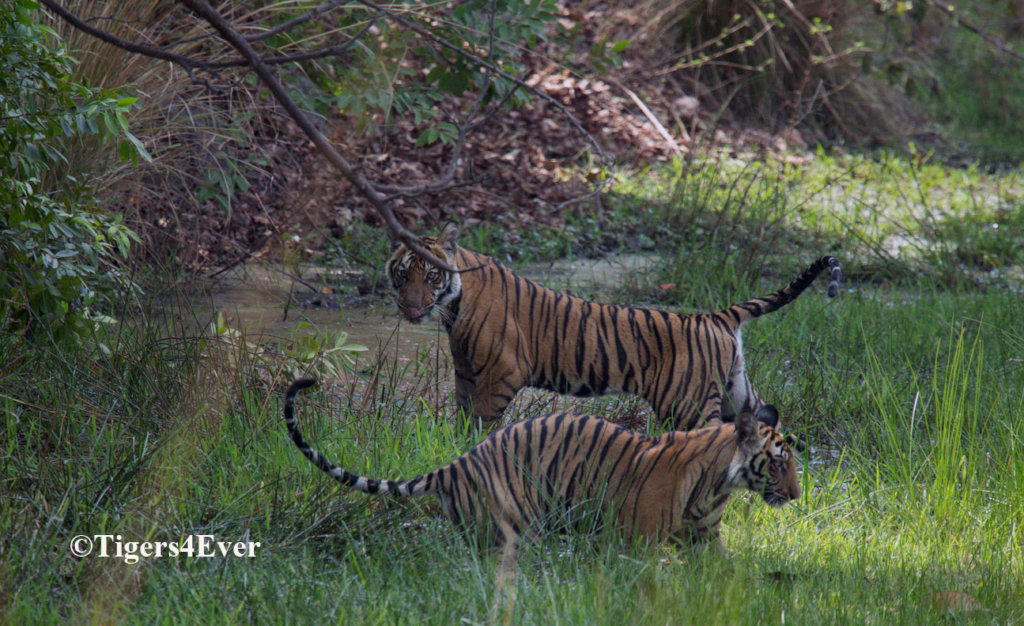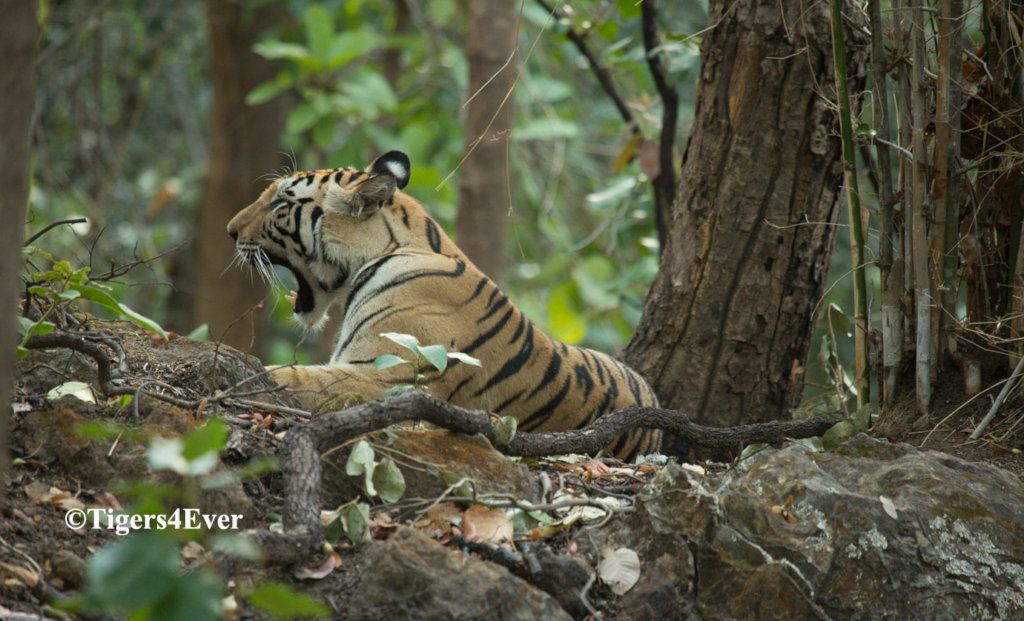By Dr. Corinne Taylor-Smith | Project Leader
Protect India’s wild tigers from the dangers exacerbated by COVID-19
The onset of coronavirus has transformed life as we know it, intensifying pre-existing problems, and triggering a tidal wave of new challenges. Uncertainty has taken root in all of our lives, seeping into jobs, livelihoods and aspirations. It’s difficult to predict what the future holds, but the fate of tigers was uncertain long before the pandemic.
It’s because of you, our donors, that we’ve been able to stay afloat in this sea of uncertainty. We’re extremely grateful to all of you. Without you, the tigers of Bandhavgarh would have no hope of survival. Only 3900 wild tigers remain globally, and every penny reinforces their protection against poachers, the changing climate, and human-animal conflict.
A conservation record we’re proud of
Through your generosity and the unwavering commitment of our team, we’ve accomplished an outstanding record of conservation. By day and night, our patrollers search the jungle for snares, traps, poison and miscreant activities, eliminating anything that threatens the welfare of wild tigers. It’s now been over 5 years since the last retaliatory poisoning of a tiger, in Bandhavgarh, and more than 44 months since we last lost a tiger to a poaching incident.
But these achievements are no reason to relax our efforts. If we don’t keep our record up, the wild tiger population will plummet and the ripple effect will be devastating. If we don’t succeed, we’ll be teetering on the edge of a world without wild tigers, and that world is far less beautiful and diverse to imagine.
COVID-19 has aggravated pre-existing wild tiger risks
As we move into monsoon peak poaching season from the end of June to the beginning of October, replenishing our vital funds is critical, especially because the pandemic has made a dire situation even worse. COVID-19 has accelerated the risks normally associated with the monsoon season. Now that most of Bandhavgarh’s human population hasn’t had paid work since the 25 March, their desperation for income propels them into tiger territory in search of any resources they can sell to live.
The jungle is rich with mahua flowers and tendu leaves, at this time of year, which can be picked and sold. Picking 5000 tendu leaves can earn someone around 100 rupees, which is roughly a day’s wages for the rural people of Bandhavgarh.The incentive far outweighs the dangers when you’re hungry, jobless and have a family to protect.
The impact can be fatal for humans
But there is a human cost to this. In the period since the lockdown began, there have been three tiger attacks by three separate tigers. As night time camouflaged a resting tiger, a 38 year old patroller, Chinta, accidentally stumbled across a sleeping tiger and the tiger’s reaction cost him his life. (Those of you who follow on Social Media will know that we raised some funds to help his widow and two young children to rebuild their lives with the set-up of a sewing business).Five days after Chinta’s death, an 18-year old girl was picking mahua flowers crouched on the jungle floor during the twilight hours at dawn. A tiger, mistook her for prey, pounced and startled the girl, delivering a fatal blow with a single swipe of its paw. In both cases the victims bled to death before appropriate help could be found. Then, ten days later, another man in his late 20s was badly mauled, again whilst collecting mahua flowers. By some miracle, someone heard his screams and rushed to help. He was taken to the nearest hospital some 60 km (38 miles) away where he is still being treated for his wounds as his recovery will be slow. It’s difficult to imagine the psychological impact of his injuries on his recovery and ability to return to work.
What happens when patrolling stops?
The reality is that although COVID-19 has stoked the flames of an already blazing threat to the survival of tigers, we don’t have enough money to put the escalating fire out. In the past two months, we’ve only generated enough to fund our patrols for 5 days in total. So, if we don’t start pulling in a steady stream of funds, we’ll have no choice but to stop our patrolling. If we have to stop the patrolling, wild tigers will die. This is what’s on the horizon for our tigers:
1. Irreparable damage to ecosystems
When desperate villagers start plundering forest resources, it sets off a chain of events with devastating consequences. By cutting down trees and branches for wood, they reduce the food source of browsers such as Nilgai, deer and monkeys (tiger prey). These prey animals enter the villages in search of food, and decimate the crops of poor rural people. Tigers, and other predators, follow in search prey and kill domestic animals as prey flee. This increases the human-animal conflict, resulting in retaliatory attacks to protect villager livelihoods. This destructive domino-effect causes irreversible damage to an already precarious ecosystem, which is why our patrols are so critical. Patrollers dissuade humans from attacking trees and in doing so, we remove the first link in this chain.
2. Forest fires
The number of people caught illegally felling trees and collecting wood in the jungle is increasing month by month. Recently, some villagers started a forest fire whilst trying to make a fire break line by burning dry leaves. Strong winds wafted the fires as far as 2 kilometres from the source, destroying precious resources for jungle dwellers along the way. When this happens, our patrollers have to abandon their search for snares to help put the fire out. Time spent away from patrols is time enough for a tiger to wander into a death trap.
3. Poaching
With extremely limited income options during the pandemic, people are forced to look for alternative means. Driven by necessity, they lay snare traps to catch deer and wild boar, but these indiscriminate traps take the life of any animal that walks into them. While some don’t deliberately kill tigers, others do lay traps with the intention of killing them. Intentional or not, the body of a tiger is a valuable export on the black market. Every part can be sold for an enticing price: their skin, teeth, claws, bones, meat and blood can be traded for enough money to feed a family for up to 12 months. Without patrollers to eliminate these traps, tigers will endure excruciatingly painful deaths.
How you can help
As you can see, the impact of our patrols goes far beyond the prevention of poaching. Tigers face complex, multi-dimensional threats, but human-led patrols are the only way we can tackle human-induced problems. We always expect peak poaching season to expose tigers to increased danger, but COVID-19 means that these perilous conditions are already here and could persist long after the monsoon rains end. Without funds, we can’t meet the critical demand for increased patrolling, to address these threats. The best way you can help us to keep protecting wild tigers is to donate. Here’s how your donations might help:
Our online store is full of merchandise which you can wear to champion our cause, and all of the sale profits go towards protecting wild tigers.
With each donation you make, you protect wild tigers, provide jobs and promote healthier human-tiger relations. Our campaigns safeguard tigers and their human protectors, but the impact of this reverberates throughout the entire jungle. On behalf the Bandhavgarh community, thank you for your support.
Links:
Project reports on GlobalGiving are posted directly to globalgiving.org by Project Leaders as they are completed, generally every 3-4 months. To protect the integrity of these documents, GlobalGiving does not alter them; therefore you may find some language or formatting issues.
If you donate to this project or have donated to this project, you can receive an email when this project posts a report. You can also subscribe for reports without donating.
Support this important cause by creating a personalized fundraising page.
Start a Fundraiser
